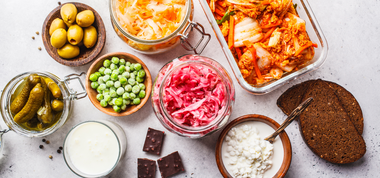In the Gut Bacteria Battle, We Want the Good Guys to Win
Did you know that there’s a whole bunch–-and I mean BUNCH–of bacteria living inside of us? If we put all the bacteria from our digestive system on a scale, it would weigh between 2 and 4 pounds. Researchers estimate we have 150 times as many bacteria in our gut as there are cells in our body.
It turns out we are all complicated ecosystems supporting various life forms. And data is emerging that the gut microbiome, the term used to describe gut bacteria as a whole, is active and is made up of good bacteria and bad bacteria, both of which influence our health.
Scientists have confirmed that diet has a huge role in determining the bacterial composition in our colons. And here’s a really powerful discovery: diet-driven changes can occur within days to weeks. Why is this so important? Because the bacterial balance within the microbiome affects our health in profound ways.
Good bacteria boost our immune system, improve digestion and absorption, make vitamins, inhibit the growth of potential pathogens, and keep us from feeling bloated. Bad bacteria can produce carcinogens, putrefy protein in our gut, produce toxins, mess up our bowel function, and cause infections. Believe it or not, the balance between good and bad bacteria can also affect our mood, our cravings, our memory and our cognition, and impact a range of disorders, including alcoholism, chronic fatigue syndrome, fibromyalgia, and restless legs syndrome. They may even have a role in multiple sclerosis and the neurologic manifestations of celiac disease.
So how do you make sure that your diet is helping support a healthy gut? Include foods classified as probiotics and prebiotics into your daily routine.
Probiotics are micro-organisms that help maintain a healthy balance of good bacteria in our gut. Yogurt can be an excellent source of probiotics but check the label for the words “live” or “active” cultures. Some cheeses contain live cultures, as do fermented foods including sauerkraut, kimchi, miso and tempeh. Note that cooking may destroy probiotics. Probiotic supplements are also available but make sure you’re picking a reliable manufacturer.
Prebiotics are dietary compounds that help probiotics thrive. Good sources of prebiotics include unprocessed grains, fruits, vegetables, beans and legumes. Without prebiotics, probiotics have far less impact on gut bacteria, reducing their health benefits.
Step One Foods are brimming with prebiotics. That’s probably why so many people experience improved gut function when they eat our foods. For the perfect prebiotic/probiotic boost for gut health, add yogurt to our Anytime Sprinkle or Smoothie Mix.
Reference: Gelland L. The gut microbiome and the brain. J Med Food. 2014 Dec;17(12):1261-72.

Tested & Proven Results.
- Cardiologist formulated
- Supported by over 500 publications
- Clinically-proven, in a double-blind randomized trial with Mayo Clinic and The University of Manitoba
80% of participants lowered their cholesterol in just 30 days. With just two servings per day, Step One Foods offers a proven-effective way to naturally lower LDL (bad) cholesterol.
Get heart health tips and articles like this, delivered right to your email.
New articles every week.
You may also like...

You don’t need to avoid foods with cholesterol…except for these




